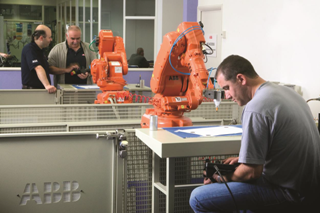Seminar and workshop from ABB Robotics provides you with the know-how to assess the potential of robotic automation, and shows how a switch to robots can help transform your profitability.
 Seminar will explain the benefits of robot automation to SMEs
Seminar will explain the benefits of robot automation to SMEs
ABB Robotics will be presenting a simple approach to introducing robot automation at a combined seminar and workshop event at its Milton Keynes offices on Wednesday 5th November. Aimed especially at UK SMEs, the event will provide a simple step-by-step guide to introducing robot automation to the factory floor.
The seminar will be built around the simple question ‘How do you know if you need a robot?’ It will start by outlining the key questions that need to be asked in order to identify whether installing a robot could be beneficial. These include assessing current performance around productivity, health and safety, quality and resource utilisation.
It will then explain how the information gathered can be used to help formulate an automation strategy, helping to identify areas that could benefit by installing a robot. This will be accompanied by a look at the potential return on investment that can be achieved in different types of applications, where the cost of purchasing, installing and commissioning a robot can be quickly recouped by improvements in productivity, efficiency and competitiveness.
An afternoon workshop session in ABB’s training centre will provide a demonstration of the latest robot technology. This will include a chance to see ABB’s RobotStudio programming software, which helps to greatly reduce the time and cost of setting up a robot system by enabling robot cells to be modelled and tested off-line.
“Misconceptions about the cost, flexibility and complexity of robots are stopping many small to medium UK manufacturing companies from realising their true potential,” says Mike Wilson, General Industry Sales Manager, for ABB Robotics in the UK. “Our seminar and workshop has been designed to help businesses determine if a robot could be beneficial and the steps to take in specifying and installing the best solution for their requirements.”